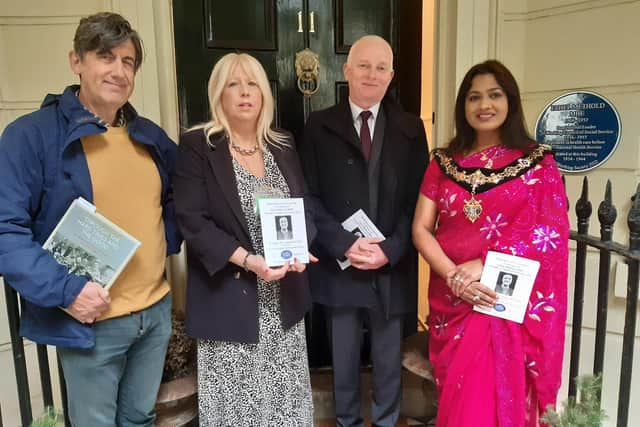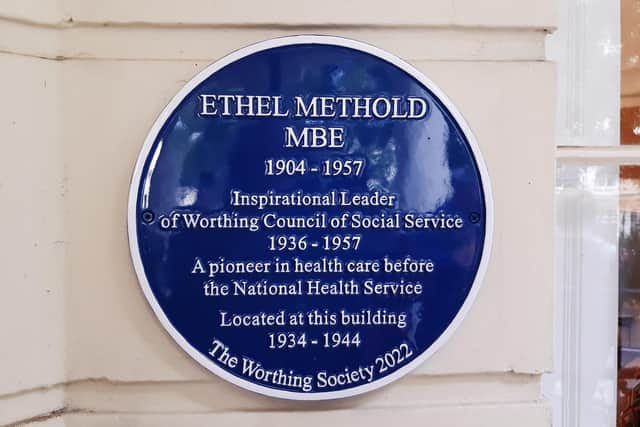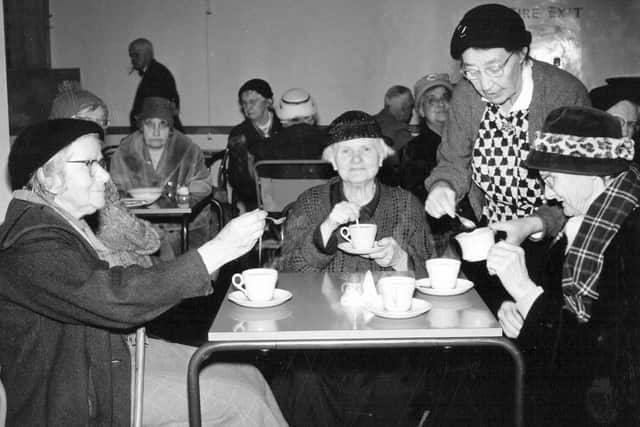Guild Care: Pioneer in health and social care honoured with blue plaque in Worthing
and live on Freeview channel 276
Ethel Methold, known as Effie, was the driving force behind Worthing Council of Social Service, which was established in 1933 and is now known as Guild Care.
She would cycle around Worthing on her bicycle, identifying the needs, and make sure the support services available were relevant for the people in the town. She had a way with people and her kindness and compassion shone through.
Advertisement
Hide AdAdvertisement
Hide AdIn the time before the NHS, Effie and a team of dedicated volunteers persuaded prominent people to pledge money for those in need and as a result, Worthing led the way with free school milk, free dental treatment for children, grants and loans for those facing financial hardship, a soup kitchen, legal aid and even subsidising free footwear for people on low incomes.


Others were involved in forming the charity, including Frank Cave, editor of the Worthing Herald for 45 years, but he said in 1983, long after she died aged 53, that Effie had been 'the greatest of them all'.
The blue plaque was organised by The Worthing Society as part of the Worthing Heritage Trails and chair Susan Belton thanked Mark and Sarah Bishop, owners of 11 Liverpool Terrace, for allowing it to be placed on their property.
The site was chosen as it was where the organisation’s first meeting was held and where Effie worked for 20 years as its secretary.
Advertisement
Hide AdAdvertisement
Hide AdLocal historian Chris Hare spoke about Effie's achievements at the unveiling ceremony on Thursday, explaining she was effectively the chief executive, as she gave the organisation purpose and direction, although her role was voluntary.


He said: "Everything she did was selfless. It was basically a local health service but it didn't have government funding. All the money had to come from benefactors and one thing that Effie Methold was extremely good at doing was charming and persuading people to give money."
As well as getting wealthy people to give money, Effie would visit professionals, like doctors and dentists, and ‘explain to them why it was an excellent idea’ to offer free appointments to people who could not afford to pay.
Chris continued: "She also was a great innovator and created a rest cottage in Thakeham for people who were suffering with mental illness, depression or anxiety and Worthing Council of Social Service funded it so people could have six weeks at the cottage, where they'd be looked after, walk in the beautiful countryside and really get a break from the stress of their lives.
Advertisement
Hide AdAdvertisement
Hide Ad"What Effie Methold did was give hope and comfort to hundreds of Worthing people who wouldn't have received it otherwise."


Mrs Belton said Effie was a lady who was ahead of her time, recognising the need for change in social care and the importance of public health and welfare.
She added: “There were many others involved with the council but I think it is fair to say that Effie was the driving force, probably, with taking it forward. The depth of this lady’s character are the foundations that she made.”
It was noted that Effie sought no personal recognition for her efforts and wherever possible, she tried to keep out of the limelight. She was, however, was made an MBE in the 1949 New Year Honours.
Advertisement
Hide AdAdvertisement
Hide AdThe mayor referenced Effie’s ‘emotional intelligence’ and her ability to ‘get things done’, as well as her high levels of empathy.
It was really the appointment of Effie as secretary in 1936 that was a turning point for the charity. Mr Hare said organisation was set up to offer health and social care support in an era that had no NHS and no welfare state but for three years, it faltered to achieve its goals, until Effie took charge.
The first annual report, a year after her appointment as secretary, declared: “The council has been able more fully than in any previous year to come nearer to realising the spirit and the letter of its aims.”
Some years later, the Rev Bernard Spaull, chairman, said: “She has given service that, measured by financial standards, would certainly be beyond the capacity of the council to repay and she has never stinted in giving her time, her skill and her experience in the service of the community.”
Advertisement
Hide AdAdvertisement
Hide AdAlex Brooks-Johnson, chief executive of Guild Care, spoke of the social care charity’s current work with older people, people with dementia, and people of all ages with learning disabilities.
He said: “Today, we face challenging times, social care in part is facing a significant pressure on staff, funding and it connections with health services. I think today’s ceremony is a really useful reminder of what we can usefully do, understanding about what it takes to get stuff done.”
Guild Care has gone from strength to strength, adapting over the decades to the needs of the community.
Mr Hare said: “It is right and fitting that this extraordinary person continues to be remembered with admiration and respect for the pioneering work she did in the town in the years before and after the Second World War. She helped shape and mould ideas of public health and welfare that would eventually become a model for the whole country to follow.
Advertisement
Hide AdAdvertisement
Hide Ad"In 1973, the Worthing Council for Social Service was renamed Guild Care and is today a tangible and living legacy of one woman’s vision of bringing help and assistance to the town’s most vulnerable and needy residents.”